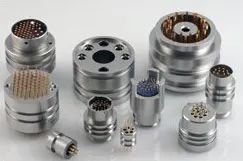What is a GTMS connector?
-
 @
Mark Ji
@
Mark Ji
- Last updated
Table of Contents
Definition of a GTMS connector
GTMS (Glass-to-Metal Seal) connector is a special electronic connector. Its unique air-tight packaging technology between glass and metal provides an indispensable solution for demanding and high-reliability applications.
It is especially suitable for maintaining the stability of electrical connections in extremely harsh environments, such as those polluted by high humidity, corrosive gases or fine particles.
The excellent sealing performance of GTMS connectors ensures the long-term stable operation of electronic systems under extreme conditions, thus meeting the stringent requirements of aviation, aerospace, military and other key fields.

Advantages of a GTMS connector
As a high-quality insulating material, glass plays an indispensable role in electronic products, forming a good combination with metal, showing excellent corrosion resistance.
Glass also has excellent resistance to temperature and pressure, which enables it to maintain stable performance under a variety of extreme conditions.
In electronic sealing elements, the glass used is usually made of ground or granulated amorphous materials such as silicate, borate and phosphate.
These materials are heated to the melting point at high temperature and then cooled to form a strong sealing structure.
The typical structure of the GTMS connector is that the metal conductor is fully surrounded by glass insulators, forming a unique packaging form, in which the glass builds a strong sealing barrier around the metal conductor.
This precise design concept not only gives the connector high reliability and durability, but also can effectively resist the attack of external environmental factors such as temperature change, humidity and corrosion.
Other means of connection include the use of O-rings to secure glass seals, or the inclusion of glass elements in the insulation design to further enhance the overall performance of the connector.
Applying fields of GTMS connectors
In the military field, it is widely used in communication systems, radar systems, surveillance equipment and weapon systems, providing a solid guarantee for the stable operation of military equipment.
In the field of aerospace, GTMS connectors also play an indispensable role, such as avionics systems, satellite communication equipment, cockpit instruments and missile guidance systems, which all depend on its high reliability and stability.
In the automobile industry, it ensures the stable electrical connection of vehicles in various harsh environments.
In the medical field, it ensures the safe operation of implantable medical devices, diagnostic equipment and surgical instruments. In the field of oil and gas, it helps the stable operation of offshore drilling platforms, downhole instruments and submarine control systems; in industrial applications, it provides key support for the normal operation of robots, programmable logic controllers, motion control systems and sensors.
Disadvantages of a GTMS connector
Glass is an efficient and durable material in GTMS connectors.
However, the inherent rigidity and brittleness of glass may cause problems if the tension and stress at the joints are not properly managed in the design.
Risks include gaps between glass and metal, separation, or damage to the structural integrity of the glass.
Glass-metal seals must withstand not only melting in the manufacturing process, but also thousands of thermal cycles under actual operating conditions.

